Iran executes 92 prisoners in 17 days, rights groups say
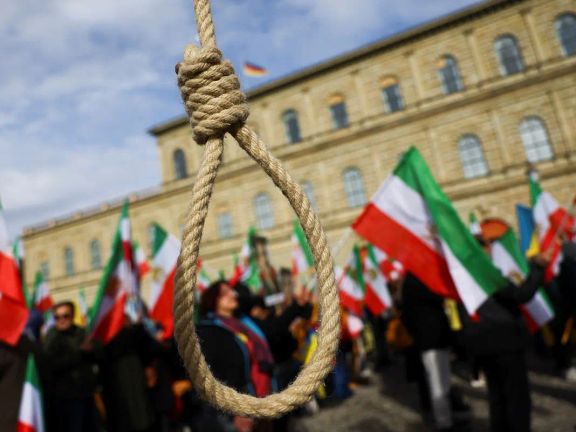
At least 92 prisoners have been executed in Iran since the start of October, averaging more than five executions per day over the past 17 days, according to rights groups.

At least 92 prisoners have been executed in Iran since the start of October, averaging more than five executions per day over the past 17 days, according to rights groups.
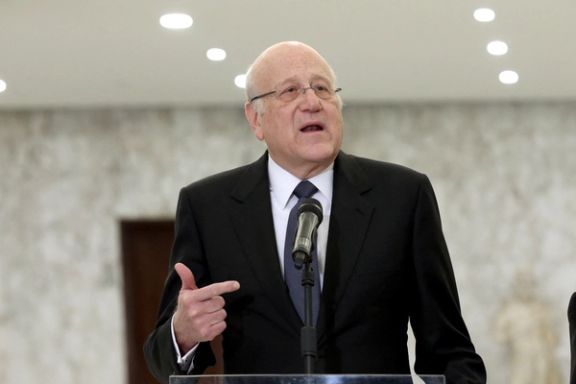
Lebanon's caretaker Prime Minister Najib Mikati has instructed the Foreign Minister to summon the Iranian Chargé d'Affaires in Beirut following reports that Tehran expressed readiness to negotiate over a UN resolution related to Lebanon.
In an interview with Le Figaro on Thursday, Iran's parliament speaker Mohammad Bagher Ghalibaf indicated Iran's openness to talks with France regarding UN Resolution 1701, which focuses on reducing tensions with Israel after the 2006 Israel-Hezbollah conflict.
Mikati asserted that the responsibility for negotiating the implementation of UN Resolution 1701 rests solely with the Lebanese state.
"We are surprised by this position, which constitutes a blatant interference in Lebanese affairs and an attempt to establish a rejected guardianship over Lebanon," a government statement quoted Mikati as saying.
Later, the Iranian news agency ISNA, quoting an unnamed source close to Ghalibaf, denied the statements attributed to him. The source said that Ghalibaf had emphasized: “Whatever the Lebanese government and resistance agree upon regarding a ceasefire, Iran will also endorse.”
Adopted in 2006, Resolution 1701 mandates that the southern border region of Lebanon remain free from the presence of weapons or military forces, except for those under the authority of the Lebanese state.
However, Israel contends that both the Lebanese army and UN peacekeeping mission known as UNIFIL have failed to adequately secure the region. Hezbollah has been engaged in a series of cross-border exchanges with Israel along the southern Lebanese frontier for nearly a year, beginning on October 8, when it initiated attacks in support of Hamas during Israel's military campaign in Gaza. In response, Israel launched a ground operation in Lebanon on October 1, following nearly a year of escalating hostilities.
Mikati has previously indicated his intention to take matters into his own hands regarding Hezbollah and Iran. Last year, he repeatedly highlighted his efforts to keep Lebanon out of the conflict, while acknowledging the limits of his government's authority. In a statement made in October 2023, he openly admitted, "The decision regarding war and peace is not in my hands or in the hands of the government."
Mikati’s remarks sparked widespread outrage in Lebanon, highlighting criticism of the government’s diminishing control.
In an interview with Al Jadeed last year, Mikati reaffirmed Lebanon's commitment to Resolution 1701, stressing his efforts to prevent the country from being dragged into a war with Israel amid the Gaza escalation.
He stated: "I am fully fulfilling my duty in this regard, and various countries are cooperating to establish stability and peace in Lebanon. My efforts are focused on this goal. I had a week full of communications with numerous heads of state and world leaders, and there was a shared understanding that we, as a government, are working with all relevant parties to keep Lebanon out of any war."
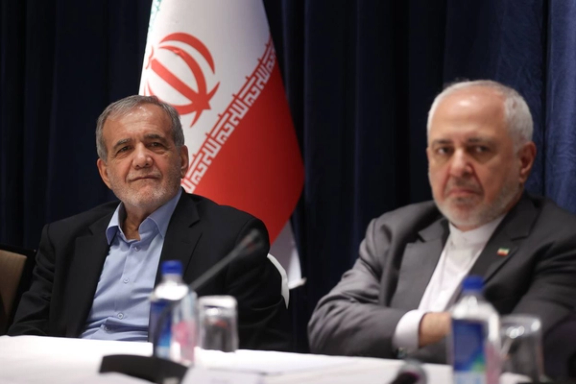
Nearly five months after Iran's ultraconservatives lost the country's presidential election to reformist-backed Masoud Pezeshkian, hardliners led by the Paydari Party are still trying to weaken the new government.
In the latest bid to strike a significant blow against President Pezeshkian, Kamran Ghazanfari, a member of the Paydari faction, issued a stern threat. He warned that if the president refuses to dismiss his strategic affairs vice president and former foreign minister, Javad Zarif, the ultraconservatives are determined to unseat Pezeshkian and push for a court sentence of at least 15 years in prison.
Paydari's opposition to Zarif appears to stem from allegations that his children hold US citizenship, which, in their view, disqualifies him from holding any high-profile position in Iran.
Reacting to the threats, three high-profile ‘reformist’ figures spoke to Khabar Online website and dismissed Paydari's threat as a "bluff." Nuclear physicist and occasional commentator Ahmad Shirzad dismissed Kamran Ghazanfari's remarks, stating that "statements from someone like Ghazanfari should not be taken seriously." He added that the ultraconservative lawmaker's pseudo-legal argument, citing the Sensitive Jobs Act, is nothing more than wishful thinking.
Former ‘reformist’ Roads Minister Ahmad Khorram recalled that Zarif had previously stepped down from the government under similar threats, only to return after Supreme Leader Ali Khamenei indicated he had no objections to his presence in the government.
Khorram emphasized, "Pezeshkian is the system's last winning card. Everyone should unite to help him solve the country's problems. This is no longer a time for hostility and provocation."
Meanwhile, prominent cleric and ‘reformist’ politician Mohammad Ali Abtahi said that the Paydari Party is holding a grudge against the Pezeshkian government and warned that if they manage to get rid of Zarif, he will not be the last one to be targeted by such threats."
In another development, a reformist journalist, Ahmad Zeidabadi opined in a sarcastic comment that three problems will be solved if hardliners really send Pezeshkian's case to the court and manage to jail him.
"First, they'll spare Pezeshkian the ordeal of navigating a political minefield, allowing him to spend his remaining years in the comfort of a prison cell. Second, the citizens who voted for him will no longer face criticism from their compatriots. And third, with the regional crisis at its peak, maybe an ultraconservative government can tackle Iran’s problems more efficiently—so they might as well reveal the ‘savior’ they claim to have up their sleeve," Zeidabadi remarked.
Meanwhile, in a commentary on Rouydad24 website, Iranian journalist Davud Heshmati wrote that the Pezeshkian administration seems to be undecided between holding its own social base or bribing its political rivals.
Commenting on Pezeshkian's conciliatory approach toward the ultraconservatives, Heshmati argued that the president's "national reconciliation" agenda appears to be little more than a retreat as his political rivals advance.
Heshmati also noted that "Pezeshkian came to power in an election with minimal voter turnout, leaving his government vulnerable. To stabilize his administration, Pezeshkian must focus on strengthening his social base and stop his pattern of constant retreat."
Lately, Pezeshkian has appointed several hardline politicians as provincial governors and to other government posts, a move that has angered ‘reformist’ groups who backed him in the election against strong conservative rivals. Although the president says his decisions stem from principal of national unity, critics accuse him of making political concessions to hardliners, calling it horse trading.
Mohammad Mohajeri, a prominent commentator allowed to speak on state-controlled media said, "A faction of Pezeshkian’s rivals believes that if he truly supports the idea of national unity, he should appoint governors from the opposing faction in provinces where he received fewer votes. However, this could turn into a "melon peel" under his feet, potentially causing the government to slip and stumble."
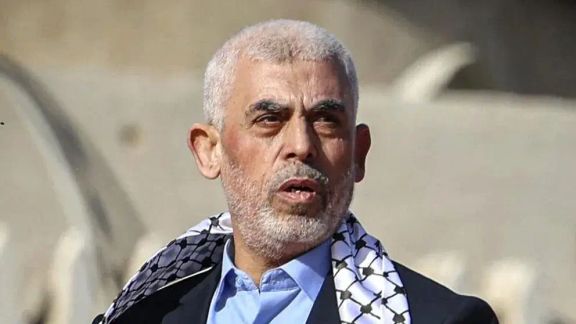
The Iranian Foreign Ministry has issued its first response to the assassination of Hamas leader Yahya Sinwar, saying that it will not weaken the fight against Israel and that others will rise to take the place of the slain militant leader.
"Undoubtedly, the physical elimination of fighters on the path of dignity and human honor will not undermine the school and path of resistance," the Foreign Ministry's statement read.
Its statement, published midday Friday, largely echoed that of the state's Strategic Council on Foreign Relations (SCFR) -- the body, composed of senior diplomats, playing a key role in shaping the state's approach on regional and international issues.
The SCFR, reporting directly to the Supreme Leader, asserted that the killing of the Hamas leader would neither weaken the "Axis of Resistance" nor deter the "Palestinian struggle against Israeli occupation."
"Just as these leaders rose from among the oppressed people of Palestine and Lebanon, others will rise to take their place," the statement by the SCFR read.
Prior to those acknowledgments, state-controlled media outlets like Tasnim, affiliated with the IRGC, had delayed over 18 hours before cautiously acknowledging Sinwar's killing.
Other domestic Iranian media echoed initial reports with minimal updates, providing narratives to protect Sinwar's image as a "hero" within the establishment.
Israel said on Thursday that it had killed Sinwar, the mastermind behind the October 7 attacks that triggered the war, marking one of the most significant strikes against Hamas' leadership in the ongoing Gaza conflict.
Iranian President Masoud Pezeshkian also responded to the assassination, saying, "The enemy should be aware that the martyrdom of commanders, heroes, and leaders will not create any disruption in the resistance of the Islamic Ummah (nation) against oppression and occupation."
Sinwar, a key figure in Hamas since its early days, had been the primary architect of the deadly assault, which claimed the lives of over 1,100 Israelis, mostly civilians – the largest killing of Jews since the Holocaust.
The SCFR emphasized its message, saying that the "Axis of Resistance"—an Iran-led alliance of groups opposing Israel and Western influence, including Hamas and Hezbollah—would not be weakened or deterred by the assassination of its leaders
In line with this approach, former Islamic Revolutionary Guard Corps (IRGC) chief commander Mohsen Rezaei responded to the killing early Friday.
He took to X to attack the Israeli operation, stating, “Warriors of the resistance front, like the martyr Yahya Sinwar, are fighting the invading soldiers on the battlefield. We are prepared for battle, and victory is ours."
Journalist and political analyst Ahmad Zeidabadi in Tehran took to his Telegram channel to say that it was not the right time for a comprehensive evaluation of Sinwar’s legacy.
In the cautiously drafted post, Zeidabadi hinted that the ultimate assessment of Sinwar’s legacy should be left to the Palestinian people in the future.
In its first public response to the killing of its leader, a senior Hamas official told NBC News on Friday that the militant group would emerge even stronger.
Sinwar's assassination follows a recent string of high-profile assassinations targeting leaders within the "Axis of Resistance" in the past few months.
Lebanon's Hezbollah militant group, part of the “Axis”, said on Friday it was moving to a new and escalating phase in its war against Israel.
Israeli Prime Minister Benjamin Netanyahu said in a video message Thursday, that Sinwar’s death marked “the beginning of the day after Hamas,” but “the task before us is not yet complete.”
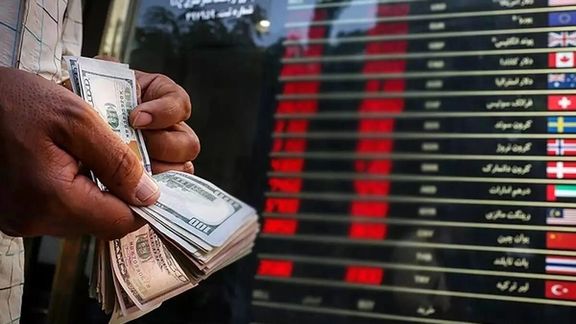
After Iran's Central Bank report on government banks providing large loans to their employees and affiliates, new reports have emerged about these loss-making financial institutions entering the local foreign currency market.
In Iran's heavily state-controlled economy, the government has long been the primary supplier of foreign currencies and controller of imports. Since 2012, when international sanctions began to sharply devalue the Iranian rial, the government has struggled to keep essential imports affordable. To manage this, it introduced multiple exchange rates, a system that has fueled widespread corruption. Influential insiders have taken advantage of government-provided privileges, such as export-import licenses, to profit from the disparities between official and market rates.
The official exchange rate is significantly lower than the free market rate for foreign currencies. The government aimed to control rising prices by subsidizing essential imports like basic food, animal feed, and medication, offering importers access to cheaper foreign currency in an effort to make these goods more affordable and prevent mass discontent
For instance, a portion of Iran's imports, such as medicine, is currently done using the government-subsidized rate of 285,000 rials per US dollar, while other imports, like food, are conducted through the "NIMA" system at 468,000 rials per dollar. Meanwhile, goods like household appliances or mobile phones are imported at the free market rate, which has soared to over 630,000 rials per dollar.
Iranian exporters are also obligated to either exchange their foreign currency earnings through the NIMA system or negotiate with importers to provide them with the required currency.
Recent reports from Iranian media reveal that Iranian banks are not only exporting goods directly but also selling the foreign currency earned from these exports to importers at a rate 10% higher than the NIMA rate. This allows the banks to profit from both exporting goods and selling the resulting foreign currency at a premium above the official NIMA rate.
Why is the government silent?
While the average inflation rate over the past few years has remained above 40%, and the Iranian rial has lost approximately 90% of its value since US sanctions were re-imposed on Iran in 2018, the government has mandated that banks provide loans to the public and companies at interest rates between 20% and 23%.
Moreover, from mid-2018 to mid-2024, the government’s debt to the country’s banking system skyrocketed by 430%, reaching 15.6 quadrillion rials—a sum equivalent to $23 billion at the free-market exchange rate and $55 billion at the official government rate.
The critical point here is that the government's debt to the banking system is in Iranian rials, meaning that with the annual decline in the value of the rial, banks are incurring massive financial losses.
For comparison, the free-market exchange rate for the US dollar has surged from 65,000 rials in mid-2018 to 630,000 rials today. As a result, the value of a large portion of the loans that Iran's banking system extended to the government and private sector at interest rates of 20% to 23% has been significantly eroded.
As a result, seven of Iran's largest banks are now struggling with accumulated losses totaling 4.6 quadrillion rials (approximately $7.3 billion at the free-market exchange rate). With the government's limited ability to cover these mounting losses, the banks face the risk of bankruptcy or are being pushed into activities normally prohibited for financial institutions, such as real estate management, property trading, and engaging in both domestic and foreign trade.
For instance, official statistics indicate that the value of banks' real estate holdings has now reached 2 quadrillion rials. Thanks to an 1100% increase in rial-denominated housing prices since mid-2018, a portion of the banks' losses has been offset.
Banks are using these unsound practices as another method to compensate for losses stemming from the declining value of the rial and the significantly lower interest rates compared to the inflation rate.
Recently, the Central Bank of Iran announced that in the last fiscal year, which began on March 20, the country's banks provided 1.2 quadrillion rials in loans to their employees or affiliated companies, which also benefits their managers. The affiliated companies use these cheap loans to plug their own financial losses.
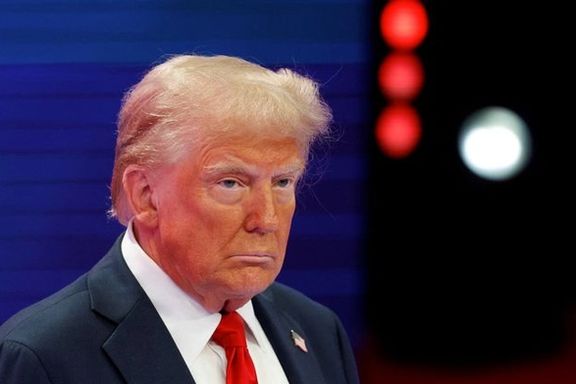
Republican presidential nominee and former US President Donald Trump appeared to rule out seeking regime change in Iran, saying he wanted the country to succeed but it could not be permitted to have nuclear weapons.
“I would like to see Iran be very successful. The only thing is, they can't have a nuclear weapon,” Trump said in an interview with Iranian-American podcaster Patrick Bet-David on Thursday.
Asked if he would like to see Iran change its ruling system, Trump said: “We can't get totally involved in all that. We can't run ourselves, let's face it.”
During the interview Trump also highlighted that he pressured China to stop buying oil from Iran during his presidency by threatening to block its access to US markets, a move he said was effective. When asked if he would revive the strategy, Trump said, "Different strategies. It all depends."
Last month, Trump told reporters that Washington must come to an agreement with Iran, in a seeming departure from his hardline stance toward its main adversary in the Middle East.
Trump's withdrawal from the 2015 nuclear deal, known as the Joint Comprehensive Plan of Action (JCPOA), in 2018, marked the beginning of what he termed 'maximum pressure' sanctions on Tehran.
The policy was praised by the group Iranians for Trump, who say that a Trump presidency could be an effective approach to advancing freedom and democracy in Iran.
Trump has repeatedly expressed his preference for deals with Washington's opponents but his comments come as tensions in the Mideast have ramped up and his campaign said Iran has made threats on his life.
The executions, which occurred in various prisons across the country, took place between 1 October and 17 October 2024.
Norway-based Iran Human Rights (IHR) said on Thursday that two men on death row for murder, identified as Abbas Karimi and Mohammad Ali Najafi, were executed in Isfahan Central Prison. Karimi had been granted an extension to raise the blood money for his case, but his family was unable to meet the deadline.
Blood money is an Islamic practice by which an alleged offender or their family can compensate an aggrieved party or relatives.
“The Islamic Republic promotes violence, cruelty and discrimination in society through inhuman retribution laws. Abbas Karimi was executed due to his inability to pay blood money,” IHR Director, Mahmood Amiry-Moghaddam said in a statement condemning the executions.
IHR said it had recorded 92 executions in the first 17 days of October.
Human Rights Activists News Agency (HRNA) reported that two prisoners who had been previously sentenced to death on drug-related charges were executed in Qazvin Prison on Thursday.
Two prisoners, including a woman in Hamedan Prison, were executed on drug-related charges on Wednesday, HRNA further reported. The man was identified as Rasoul Feili, while the woman’s identity was not disclosed.
IHR also that another prisoner named Mohsen Mokhtari was executed in Adelabad prison in Shiraz on murder charges.
Six prisoners on death row for murder charges were executed in the same prison last Sunday, the US-based Center for Human Rights in Iran reported.
Amnesty International on Friday warned that Iran plans to execute Mohammad Reza Azizi on Monday, 21 October. Azizi was just 17 when he was arrested and sentenced to death. Amnesty called on Iranian authorities to halt the execution, stating that Iran is violating international law by sentencing a minor to death.
Iran conducted the most executions of any country in the world after China last year, Amnesty said in a report in May, adding that nearly 75% of all executions worldwide in 2023 outside China were in Iran.
The recent wave of executions brings the total number of hangings in Iran this year to more than 567, including 20 women, according to rights groups.
Earlier this month, HRNA reported that at least 811 people had been executed in Iran between 10 October 2023 and 8 October 2024, coinciding with the annual World Day Against the Death Penalty.